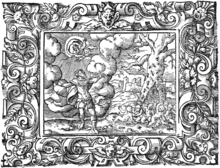Myrmidons
The Myrmidons (Ancient Greek Μυρμιδόνες Myrmidónes) were an Achaean tribe in southern Thessaly from before the Dorian immigration. They are known mainly from Greek mythology as the Phthiotic people, who had their residence around Phthia and Larisa Kremaste.
Homer's Iliad describes how, under the leadership of Peleus' son Achilles, the small army of the Myrmidons went into battle for Troy, where they distinguished themselves by unrestrained obedience, bravery and superior fighting ability. They wore black armor and shields. They played a crucial role in the fall of Troy. After the war, Neoptolemos, the grandson of Peleus, brought the Myrmidons home.
The following five leaders of the Myrmidons are mentioned by name in the Iliad: Menesthios, Eudoros, Peisandros, Phoinix and Alkimedon.
The Myrmidons, according to one tradition, are the descendants of the eponymous ancestor King Myrmidon of Phthia (Phthiotis), a son of Zeus and the "far-seeing" Eurymedusa, a princess of Phthia. She was seduced by Zeus in the guise of an ant (ancient Greek μύρμηξ myrmēx), hence his name. Others say that Myrmex was the name of Eurymedusa's mortal husband, and that Zeus took his form to approach her. His wife was Peisidike, daughter of Aiolos and Enarete, with whom he begat Actor and Antiphos (who was the first to invite Peleus to stay in Thessaly). Hyginus also attributes to him the two daughters Ischylla and Eupolemia, and Aelianus another son, Erysichthon.
According to a legend of their origin, they once lived on the island of Aigina, whose soil, although fertile, was extremely stony on the surface and therefore very bare. For this reason the inhabitants, in order to reclaim the soil in the manner of ants, dug through the earth with extraordinary diligence and spread it over the stones in order to obtain arable land, and no less in the manner of ants they lived very sparingly under the ground in caves. But then they went along with Peleus, when he was banished from thence by his father Aiakos. Then in Phthia Peleus was taken in by king Eurytion, the son of Actor, and the latter unburdened him and gave him his daughter Antigone together with the third part of his land.
The interpretation as "ant-men" (μύρμηκες mýrmēkes) is mentioned for the first time in Ovid's Metamorphoses. According to this, the name is derived from the fact that Zeus once gave new inhabitants to the island of Aigina, at the request of Aiakos, creating them from ants, since the island had been deprived of its original inhabitants by a plague sent by the vengeful Hera. Ovid seems to have borrowed this version from the Greek historian Thucydides, who described a plague in Athens.
The Aiginetic saga of the transformation of the ants into men by Zeus-for the sake of his son Aiakos (Αιακός of αῖα earth), the husband of Endeis (Ένδηΐς of εν and δα earth)-is originally independent of this Zeus-Myrmidon stemma, and seeks to establish mythically the autochthony of the Aiginetic Aiakids by derivation from the earth-animal. The Thessalian stemma originally does not know the ant etymology any more than the Aiginetic saga. Nevertheless, the port Μύρμηξ (Murmex) of the coast of Magnesia, famous through Thetis-Σηπιάς (Sipias), gives Sepias food for thought, while, however, the affinity of the Thessalian Achaians, the mythical 'Myrmidones,' with the Aiginetic Achaians is certain, and the origin of the latter from the latter is highly probable.

Ortus Myrmidonum : engraving by Virgil Solis (from P. Ovidii Metamorphosis 1581)
Secondary literature
- Jacob Burckhardt, Critical Complete Edition: Greek Cultural History 2: The Metamorphoses. The Greeks and their gods. General survey of Greek life. Volume 20 (Hardcover Edition)
- Myths of ancient cultures. Reclam, Ditzingen 2002
- [A] Ludwig Preller: Greek Mythology II - Heroes. Part C: The Trojan Cycle. c. Hellas and the Aeakids (Project Gutenberg-DE)
- [B] Karl Tümpel: Myrmidon. In: Wilhelm Heinrich Roscher (ed.): Ausführliches Lexikon der griechischen und römischen Mythologie. Band 2,2, Leipzig 1897, Sp. 3312-3314 (Digitalisat).
Questions and Answers
Q: Who were the Myrmidons in Greek mythology?
A: The Myrmidons were a legendary people of Greek mythology.
Q: Where were the Myrmidons native to?
A: The Myrmidons were native to the region of Thessaly.
Q: How were the Myrmidons described in Greek mythology?
A: The Myrmidons were said to be the fiercest and strongest of all the warriors in Greece.
Q: Who led the Myrmidons during the Trojan War?
A: During the Trojan War, the Myrmidons were led by Achilles.
Q: What is the origin of the name "Myrmidons"?
A: The name is derived from the Greek word myrmex (μύρμηξ), meaning "ant", as they were said to be created by Zeus from a colony of ants.
Q: What book mentions the leadership of Achilles over the Myrmidons during the Trojan War?
A: Homer's Iliad describes the leadership of Achilles over the Myrmidons during the Trojan War.
Q: What distinguishes the Myrmidons as a group of warriors?
A: The Myrmidons were distinguished as the fiercest and strongest of all the warriors in Greece.
Search within the encyclopedia